Eliyah Ryals: Finding the Perfect Fit
It’s not common for people to find their perfect career fit straight out of college. It’s even less common to find it in the town you grew up in. But that’s exactly what happened when Eliyah Ryals was told about vacancies at Panel Built and made the decision to apply.

It’s been eight years since Eliyah started working for the Blairsville, GA, modular building manufacturer, but it hasn’t always been a straight line to his current role as sales manager.
Excelling as an Installer
When Eliyah first applied for a job at Panel Built, the vacancies were available on the factory floor. Specifically, Eliyah was hired to oversee the installation process.
However, as a company that values hands-on experience, Eliyah was first assigned to work alongside the installers, building and installing a variety of mezzanine offices, guardhouses, prefabricated offices and more.
However, while the role was meant to be a temporary one, Eliyah performed so well that it became permanent. For the next four years, Eliyah worked on the installation team, travelling from coast to coast, delivering and installing modular structures for some of the largest companies in the United States.
A Move Into Engineering
After gaining invaluable, hands-on experience building and assembling the range of modular buildings and structures Panel Built created for several years, an opportunity to work in the engineering department came up.
True to form, Eliyah embraced the new challenge, and for the next couple of years, he used his detailed product knowledge to help Panel Built develop custom solutions for their clients.
Born for Sales
While Eliyah Ryals might have accepted every opportunity that came his way at Panel Built, his goal was always to work in sales.
Raised by parents who both work in the sales field, Eliyah always knew that’s what he wanted to do. But he was willing to do what was necessary to prove himself on the way there.
Often, his approach has been a little different from what most of us would do.
Like when he requested a meeting with Dave Arnold, the general manager of Panel Built, only to tell him about his dream to work in sales. Or when he dove right in and made every other role along the way his own, even when it wasn’t in sales.
Many of us would not spend more than a year or two in a role that wasn’t our ideal. Eliyah has stayed focused on his for over eight years, and now that he’s reached the position of sales manager, he’s not changing his approach. He’s always maintained his focus on his goals, and so far, it’s a winning strategy.

A Growing Force In Modular Structures
When Eliyah Ryals started his career at Panel Built, the company employed less than 100 people. Today, the Panel Built team is at 350, and there’s no sign of anything slowing down.
Eliyah and his sales team often field over 60 leads per day, and they routinely handle projects well over $1 million in value.
Looking back on the time he spent getting his hands dirty as an installer, Eliyah acknowledges the value of that kind of hands-on training. It allows him to answer every question his customers might pose, but it also allows him to provide another level of technical mentorship to his own sales team.
“While I wouldn’t have chosen this path to where I am today, now that I’m here, I wouldn’t change a thing.”
What's Next?
You could say that the fast pace of our modern world is a big part of the rapid growth Panel Built has seen so far. Instead of taking weeks or months to create the structures their clients need to operate at optimal levels, Panel Built can deliver them in weeks or even days.
“We’ve had clients ask us to complete and install over a weekend,” says Ryals, “and we find a way to make it happen.”

In fact, the company prides itself on tackling jobs that many others would consider impossible, and Eliyah Ryals and his can-do attitude backed by flexibility, adaptability, and the willingness to make decisions when they need to be made are a big part of that.
“I’m fully committed to helping Panel Built grow. Whether that means developing new products or opening new manufacturing facilities, or anything else we need to do."
When you consider how far the company and Ryals have come over the past few years, there’s very little doubt that they’ll both meet those goals.
About the Author: Tamara Aspeling is a published author and freelance writer who specializes in construction and writes for print and web. She’s also a trained estimator and project manager with over 20 years of industry experience. You can reach her at www.theconstructionwriter.ca or words@theconstructionwriter.ca.
More from Modular Advantage
AoRa Development Aims for New York’s First Triple Net Zero Building Using Modular Methods
More cities are providing funding for newer infrastructure projects as long as they meet sustainability requirements. This is how modular can fit the bill, thanks to its lower waste production.
Developers and Designers: Lessons Learned with Modular Design
Modular construction is attractive to many developers because sitework and module construction can occur simultaneously, shortening the schedule and reducing additional costs.
UTILE: Putting Modular Building on a Fast Track
In Quebec, UTILE is taking the lead in creating affordable modular buildings to help decrease the student housing shortage. During the process, the company discovered what it takes to make the transition to modular building a success.
Sobha Modular Teaches Developers How to Think Like Manufacturers
With its 2.7 million square foot factory in UAE, Sobha Modular is bringing both its high-end bathroom pods to high-end residences to Dubai while developing modular projects for the U.S. and Australia.
RoadMasters: Why Early Transport Planning is Make-or-Break in Modular Construction
In modular construction, transportation is often called the “missing link.” While it rarely stops a project outright, poor planning can trigger costly delays, rerouting, and budget overruns.
Navigating Risk in Commercial Real Estate and Modular Construction: Insights from a 44-Year Industry Veteran
Modular projects involve manufacturing, transportation, and on-site assembly. Developers must understand exactly what they are responsible for versus what they subcontract. Risk advisors should research the developer’s contractors, subcontractors, and design-build consultants—especially the modular manufacturer.
Art²Park – A Creative Application of Modular and Conventional Construction
Art²Park is more than a park building—it’s a demonstration of what modular construction can achieve when thoughtfully integrated with traditional materials. The use of shipping containers provided not only speed and sustainability benefits but also a powerful structural core that simplified and strengthened the rest of the building.
Building Smarter: A New Standard in Modular Construction Efficiency
Rising material prices, labour shortages, expensive financing and tightening environmental rules have made conventional construction slower, costlier, and more unpredictable. To keep projects on schedule and within budget, builders are increasingly turning to smarter industrialized methods.
Resia: Breaking All the Rules
Resia Manufacturing, a division of U.S.-based Resia, is now offering prefabricated bathroom and kitchen components to industry partners. Its hybrid fabrication facility produces more precise bathroom and kitchen components (modules) faster and at lower cost than traditional construction. Here’s how Resia Manufacturing does it.
How LINQ Modular Innovates to Bring Modular To The Market in the UAE and Beyond
LINQ Modular, with an office and three manufacturing facilities in Dubai, is a modular firm based in United Arab Emirates. The company is on a mission: to break open the housing and construction markets in the Gulf Cooperation Council (GCC) area with modular.










